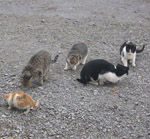Evaluating ecotourism in Costa Rica...
 Development,
Development,  Economics
Economics  A canopy walkway disappearing into a cloud forest near Monteverde, Costa Rica. Image credit, Dirk van der Made.In the sometimes fiery conflict between nature conservation and economic development, ecotourism has emerged as a shining knight in white armor. From Kenya to Cost Rica to Wyoming, ecotourism projects have been springing up under the idea that you can protect natural areas while supporting local livelihoods through sustainable tourism.
A canopy walkway disappearing into a cloud forest near Monteverde, Costa Rica. Image credit, Dirk van der Made.In the sometimes fiery conflict between nature conservation and economic development, ecotourism has emerged as a shining knight in white armor. From Kenya to Cost Rica to Wyoming, ecotourism projects have been springing up under the idea that you can protect natural areas while supporting local livelihoods through sustainable tourism.
But for all its hype does ecotourism really work?
New research attempts to answer this difficult question using four destinations in Costa Rica as a case study. The authors conducted interviews with stakeholders and reviewed past research on the areas. They weighed the positives and negatives of ecotourism from three different perspectives: environmental, economic, and social.
The researchers found that ecotourism has helped prevent further deforestation by giving an economic value to nature. In the regions of Manuel Antonio and Monteverde, where ecotourism has reached a larger scale, it has diversified the economic base.
Unfortunately, ecotourism has brought numerous negative environmental, economic, and social impacts as well. It has led to incompatible development, sanitation problems, increased inflation and weakening of community social structures. Where ecotourism has remained small scale and local people have retained control, the negative impacts have been less but the economic benefits have been smaller as well.
The researchers argue for stronger capacity building for local community planning. They state:
"In the Monteverde region, the 'community planning' system stopped functioning after the community became too large. This led to an escalation of tourism growth and environmental problems…Our analysis reveals that a further development of ecotourism requires a better institutional capacity and more integrated planning on the local level. Municipalities should be challenged to start such integrated planning initiatives."
While the negative consequences of ecotourism are disconcerting, one has to take into consideration that alternative land uses such as logging or agriculture could conceivably be much more harmful. Below, I summarize some of the major positive and negative impacts that study found for ecotourism in Costa Rica:
Positive Impacts
- Ecotourism is preventing further deforestation
- In Manuel Antonio and Monteverde, ecotourism is diversifying the economic base. In Monteverde, tourism has strong linkages to other sectors of the economy - specifically local handicraft production.
- Revenue from tourism is funding environmental education and other social programs for local people.
- In some areas ecotourism is leading to empowerment of women.
Negative Impacts
- Incompatible development and infrastructure in the Manuel Antonio, Monteverde, and Tortuguero regions has resulted in land clearance, disturbance of wildlife and an increased possibility of erosion.
- Garbage and sewage problems have arisen.
- Low levels of local ownership in the Manuel Antonio region and an emphasis on package tours in Tortuguero means that much of the money is made by outsiders and there is little room for local entrepreneurs.
- Increased inflation in Manuel Antonio and Monteverde has made it difficult for some local people to make ends meet.
- Community organizations have diminished in some areas as a result of growing number of tourists and immigrants. In Monteverde, this has caused the community development planning system to stop functioning effectively.
--Reviewed by Rob Goldstein
Koens, J., Dieperink, C., & Miranda, M. (2009). Ecotourism as a development strategy: experiences from Costa Rica Environment, Development and Sustainability DOI: 10.1007/s10668-009-9214-3




Reader Comments